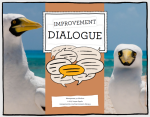Agile Management - Complexity Thinking View more presentations from Jurgen Appelo.

What Are Powerful Questions?
With powerful questions we shift from lamenting about problems of the past to inquiring into ideas for a possible future.
Knowing that we should inquire into an organization in a positive way (see my post about Appreciative Inquiry), it is useful to know what kind of questions we should ask. To learn more about this we can turn our attention to the concept of Powerful Questions.
A powerful question stimulates curiosity and reflection in a conversation, it leads the participants toward creativity, energy, and forward movement, it helps to channel attention and focus, and it has a tendency to invite further questions. My own very first powerful question, satisfying all these criteria, would be, “How can we make our questions more powerful?”
We can make our questions more powerful by preferring the use of why, how, and what over who, when, where and which, because the former invite deeper discussions than the latter. We can keep the scope of our questions realistic, and our insights actionable, by covering a part of the system that is still within the circle of influence of the participants. And we can modify our questions so that they challenge rather than hide our underlying assumptions.
For example, the following question is not powerful:
Who is responsible for the failures of this organization?
The question starts with the narrow interrogative who; it has a scope that is far too wide (all failures in the whole organization); and it assumes that someone is to blame. Instead, with a few small changes we can make the question more powerful:
Why does our team feel that the organization is failing?
This new question starts with the more powerful why; it narrows the scope to what the team is able to deal with (their own attitude); and it challenges the assumption that the organization is failing at all.
By asking more powerful questions an organization is able to engage people’s thinking about complex issues and shift from lamenting about problems of the past to inquiring into ideas for a possible future. As coaches and managers we have to develop the organization’s capacity to be inquisitive, and learn, adapt, and seize opportunities for change. We can do that by creating a climate of discovery, suspending judgment, exploring beliefs, connecting ideas, widening perspectives, honoring contributions, articulating understanding, and sharing collective insights and actions. And by shortening our sentences. 🙂
 This text is part of the article Improvement Dialogue, which is a chapter in the Management Workout book. Do you want exclusive access to my latest writing? Subscribe to the mailing list!
This text is part of the article Improvement Dialogue, which is a chapter in the Management Workout book. Do you want exclusive access to my latest writing? Subscribe to the mailing list!





